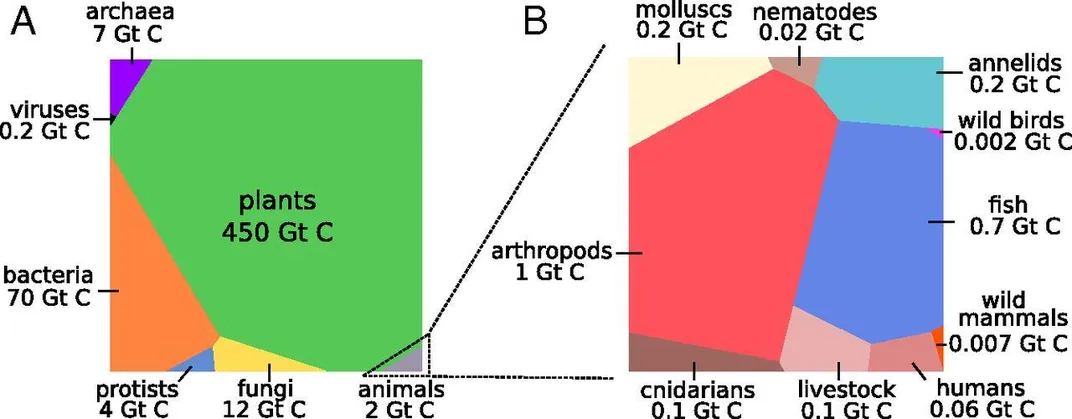Humans Make Up Just 1/10,000 of Earth’s Biomass
Plants make up 80 percent, but human activity chopped that number in half over the last 10,000 years
/https://tf-cmsv2-smithsonianmag-media.s3.amazonaws.com/filer/b6/42/b642cee6-03bb-423c-8ca3-5f14f145e25e/jungle.png)
The human population on Earth is about 7.6 billion people (and counting). But according to a new global census of biomass, humans are barely a rounding error compared to the rest of life on Earth. As Seth Borenstein at The Associated Press reports, the biomass of humanity—measured by the dry-weight of carbon that makes up our bodies—is equivalent to just one ten-thousandth of all biomass on our planet.
Anyone who has walked through a jungle or wandered a grassland may already have guessed that humans are a pretty small part of Earth’s organic matter. The carbonaceous winners are plants, which make up about 80 percent of all biomass on Earth. Bacteria comes in second at 13 percent and fungus is third at just 2 percent.
Of the 550 gigatons of biomass carbon on Earth, animals make up about 2 gigatons, with insects comprising half of that and fish taking up another 0.7 gigatons. Everything else, including mammals, birds, nematodes and mollusks are roughly 0.3 gigatons, with humans weighing in at 0.06 gigatons. The research appears in The Proceedings of the National Academy of Sciences.
“The fact that the biomass of fungi exceeds that of all animals’ sort of puts us in our place,” Harvard evolutionary biologist James Hanken, who was not involved with the study, tells Borenstein.

This isn’t the first such estimate, but it is likely the most accurate. In recent years, improvements in satellite technology produced finer-scale data and increasing emphasis on global sampling efforts both made this recent work possible.
As Elizabeth Pennisi at Science reports, the research of this latest work spent three years poring over the scientific literature to come up with an accurate measurement for each kingdom of life. While the findings represent their best efforts, they do acknowledge that their calculations could still use refining, and the numbers might change with updated survey data.
As Pennisi reports, finding the weight of life on Earth was not the research team's ultimate goal. Instead, they are trying to determine the dominant proteins on the planet. Though that proved a hard nut to crack, they’re continuing to work toward an answer.
While the latest study shows how insignificant humanity is when it comes to the carbon in our bodies, it also shows our oversized impact on the rest of Earth’s biomass. Humans, along with all of our livestock, outweigh all other wild mammals by 20-fold, Pennisi writes. And in the last 10,000 years, human activity slashed plant biomass by half and reduced wild mammals by 85 percent.
"When I do a puzzle with my daughters, there is usually an elephant next to a giraffe next to a rhino,” study author Ron Milo, a biologist at the Weizmann Institute of Science in Israel, tells Borenstein. “But if I was trying to give them a more realistic sense of the world, it would be a cow next to a cow next to a cow and then a chicken.”